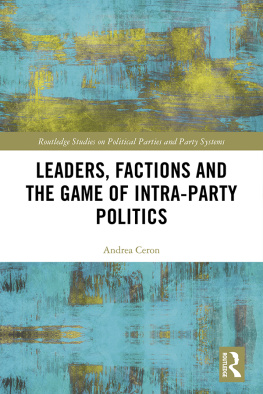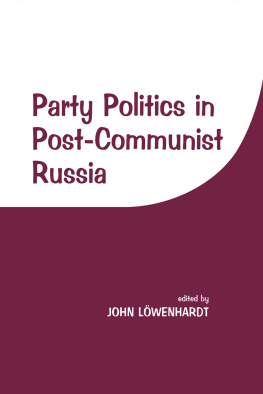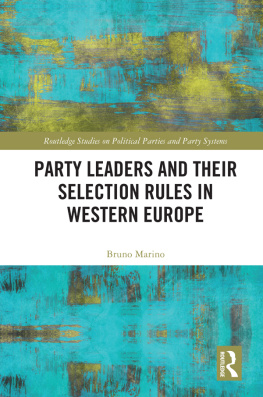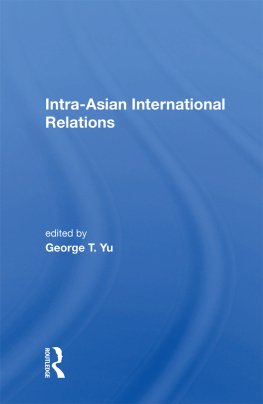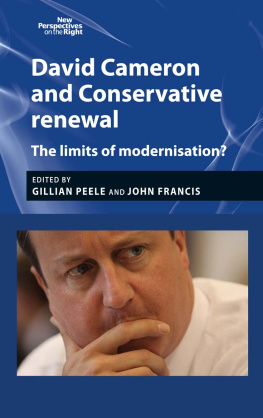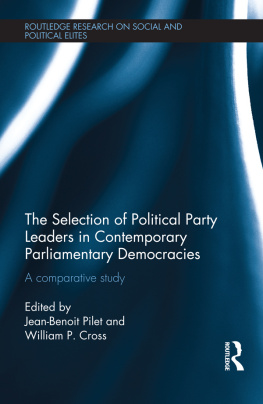Ceron - Leaders, factions and the game of intra-party politics
Here you can read online Ceron - Leaders, factions and the game of intra-party politics full text of the book (entire story) in english for free. Download pdf and epub, get meaning, cover and reviews about this ebook. City: Deutschland, France., Frankreich, Germany., Italien, Italy., year: 2019, publisher: Routledge, genre: Politics. Description of the work, (preface) as well as reviews are available. Best literature library LitArk.com created for fans of good reading and offers a wide selection of genres:
Romance novel
Science fiction
Adventure
Detective
Science
History
Home and family
Prose
Art
Politics
Computer
Non-fiction
Religion
Business
Children
Humor
Choose a favorite category and find really read worthwhile books. Enjoy immersion in the world of imagination, feel the emotions of the characters or learn something new for yourself, make an fascinating discovery.
Leaders, factions and the game of intra-party politics: summary, description and annotation
We offer to read an annotation, description, summary or preface (depends on what the author of the book "Leaders, factions and the game of intra-party politics" wrote himself). If you haven't found the necessary information about the book — write in the comments, we will try to find it.
Ceron: author's other books
Who wrote Leaders, factions and the game of intra-party politics? Find out the surname, the name of the author of the book and a list of all author's works by series.
Leaders, factions and the game of intra-party politics — read online for free the complete book (whole text) full work
Below is the text of the book, divided by pages. System saving the place of the last page read, allows you to conveniently read the book "Leaders, factions and the game of intra-party politics" online for free, without having to search again every time where you left off. Put a bookmark, and you can go to the page where you finished reading at any time.
Font size:
Interval:
Bookmark:

The book provides a comprehensive view on the internal life of parties and investigates the dynamics of intra-party politics in different party environments to explain in which circumstances the party leader is more or less bound by the wills of party factions.
Analyzing almost 500 intra-party documents from Italy, Germany and France, it presents a theory of intra-party politics that illuminates internal decision-making processes and sheds light on the outcomes of factional conflicts on the allocation of payoffs within the party, on the risk of a party split and on the survival of the party leader. Using text analysis, the results show that consensual dynamics can allow to preserve party unity and that directly elected leaders can exploit their larger autonomy either to reward followers or to prevent splits.
This text will be of key interest to scholars and students of Party Politics, Political Institutions, European Politics and more broadly to Comparative Politics, Political Theory and Text Analysis.
Andrea Ceron is Assistant Professor at the Department of Social and Political Sciences, University of Milan, Italy.
Routledge Studies on Political Parties and Party Systems
Series Editors: Ingrid van Biezen
Leiden University, the Netherlands
and
Fernando Casal Brtoa
University of Nottingham, UK
This new series focuses on major issues affecting political parties in a broad sense. It welcomes a wide-range of theoretical and methodological approaches on political parties and party systems in Europe and beyond, including comparative works examining regions outside of Europe. In particular, it aims to improve our present understanding of these topics through the examination of the crisis of political parties and challenges party organizations face in the contemporary world, the increasing internal complexity of party organizations in terms of regulation, funding, membership, the more frequent presence of party system change, and the development of political parties and party systems in under-researched countries.
The Regulation of Post-Communist Party Politics
Edited by Fernando Casal Brtoa and Ingrid van Biezen
Party Systems in Young Democracies
Varieties of institutionalization in Sub-Saharan Africa
Edalina Rodrigues Sanches
Opposition Parties in European Legislatures
Conflict or Consensus?
Edited by Elisabetta De Giorgi and Gabriella Ilonszki
Party Members and their Importance in Non-EU Countries
A Comparative Analysis
Edited by Sergiu Gherghina, Alexandra Iancu and Sorina Soare
Party System Change, the European Crisis and the State of Democracy
Edited by Marco Lisi
Do Parties Still Represent?
An Analysis of the Representativeness of Political Parties in Western Democracies
Edited by Knut Heidar and Bram Wauters
For more information about this series, please visit: www.routledge.com/Routledge-Studies-on-Political-Parties-and-Party-Systems/book-series/PPPS
Andrea Ceron

First published 2019
by Routledge
2 Park Square, Milton Park, Abingdon, Oxon OX14 4RN
and by Routledge
52 Vanderbilt Avenue, New York, NY 10017
Routledge is an imprint of the Taylor & Francis Group, an informa business
2019 Andrea Ceron
The right of Andrea Ceron to be identified as author of this work has been asserted by him in accordance with sections 77 and 78 of the Copyright, Designs and Patents Act 1988.
All rights reserved. No part of this book may be reprinted or reproduced or utilized in any form or by any electronic, mechanical, or other means, now known or hereafter invented, including photocopying and recording, or in any information storage or retrieval system, without permission in writing from the publishers.
Trademark notice: Product or corporate names may be trademarks or registered trademarks, and are used only for identification and explanation without intent to infringe.
British Library Cataloguing-in-Publication Data
A catalogue record for this book is available from the British Library
Library of Congress Cataloging-in-Publication Data
A catalog record has been requested for this book
ISBN: 978-1-138-55000-1 (hbk)
ISBN: 978-1-315-14709-3 (ebk)
Typeset in Times New Roman
by Wearset Ltd, Boldon, Tyne and Wear
To those who brought me to my first (2001) and latest (2013) party congress
Everything started when I was a kid, and my father and grandfather brought me with them to a local party congress meeting held in my town. The room was crowded full of people and smoke. There were not enough chairs for everyone and a lot of people were standing, raising their hands from time to time to cast a vote. It was noisy. I saw people sharing ink-dirty newspapers that contained the whole (long) texts of congress motions, passing them from hand to hand as precious goods. There were keynote speakers presenting each motion, common members having their 15 minutes of fame to state their vote declaration. People were chatting just outside the room. Others were bargaining behind closed doors. Suddenly they came out with a creased sheet. That was the list of delegates elected to the next stage, and a draft of the local party executive committee. Thats where everything started.
I went to another party congress 12 years later. Everything was different. Bigger room. Less smoke. Fewer speakers and pointless speeches. Boring cheap rhetoric, but an enthusiastic audience. Shorter motions, on colorful high-quality paper. Fewer decisions to be taken. I felt as if something had changed.
Now its exactly ten years from the first time I started to study party factions. It was just a few weeks after the beginning of my PhD, in January 2009, when I came up with the first general idea of investigating factional conflict and cooperation inside parties. Three years later I was defending my PhD dissertation and nowadays that idea is still at the core of the present book. A lot of water has gone under the bridge in these ten years and my original project has grown up so fast. More countries, more analyses, a refined game, new insights and a wider time span, ranging from 1946 to the latest party congress held a short time ago, in December 2018.
It has been a huge data collection effort indeed. I gathered almost 500 textual documents, in several rounds, analyzing up to 3.6 million words. I went to libraries hosted in places forgotten by God, to find pieces of paper forgotten by humans. Sheets dating back to the 1940s almost crumbled in my hands. Thats what research must look like. But time has passed, and the most recent waves of data collection have been comparatively easier in the new digital era.
It has been a huge effort on my side. But I also want to thank all those who contributed to this project in a way or another. I start with my family, bloodbefore faction. I also thank my (former and present) colleagues at the University of Milan, too many to mention them all.
The thorough early draft of the project was presented, for the first time, at the Research Workshop of Comparative Politics, Harvard University (Cambridge, MA, February 2, 2011). All the smart comments that I received therein by the discussant and the audience have been crucial in order to improve my work. In the six months I spent there I also received precious comments from Stephen Ansolabehere, Nahomi Ichino, James Snyder and Arthur Spirling. I want to thank them for devoting time to read and discuss the present research with me.
Font size:
Interval:
Bookmark:
Similar books «Leaders, factions and the game of intra-party politics»
Look at similar books to Leaders, factions and the game of intra-party politics. We have selected literature similar in name and meaning in the hope of providing readers with more options to find new, interesting, not yet read works.
Discussion, reviews of the book Leaders, factions and the game of intra-party politics and just readers' own opinions. Leave your comments, write what you think about the work, its meaning or the main characters. Specify what exactly you liked and what you didn't like, and why you think so.

